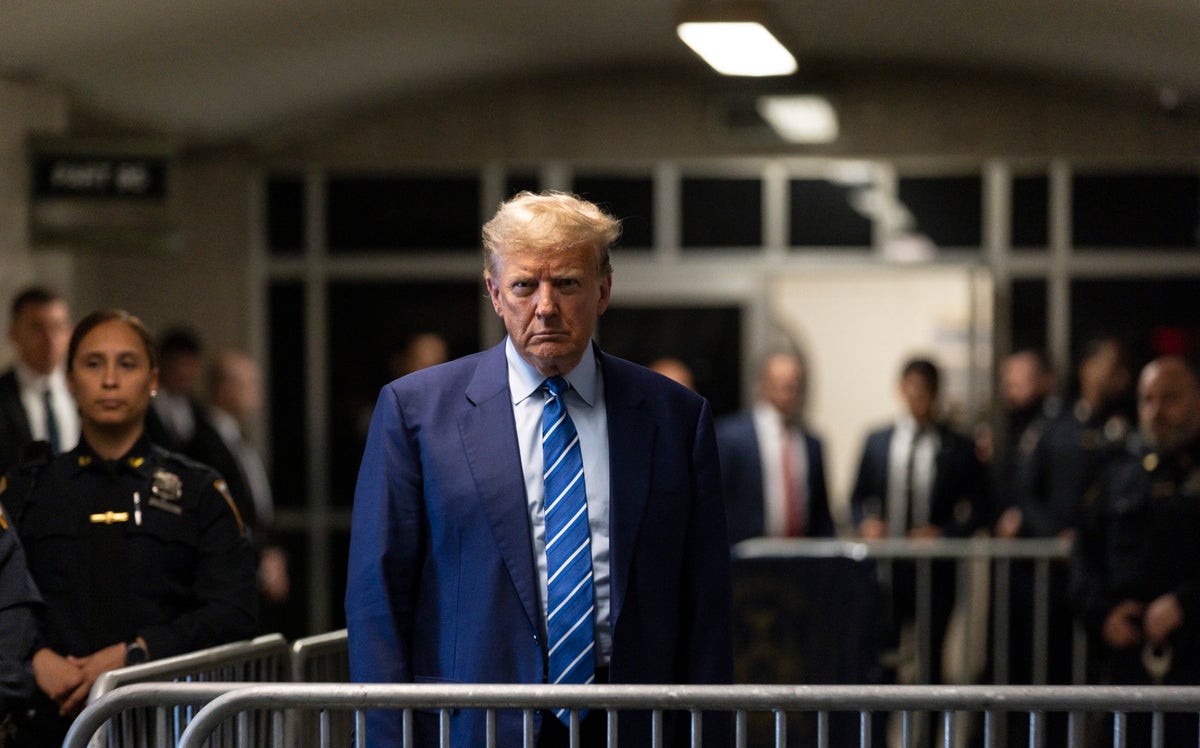
Support truly
independent journalism
Former presidents have some immunity from criminal prosecution for official actions, the Supreme Court ruled on Monday – extending the delay in the criminal case against Donald Trump on charges he plotted to overturn his 2020 presidential election loss, and all but ending prospects he could be tried before the November election.
In a 6-3 decision released on Monday, the court rejected Trump’s suggestion of total immunity but said some of the actions laid out in the federal election interference indictment related to his official acts and are protected.
“The president enjoys no immunity for his unofficial acts, and not everything the president does is official. The president is not above the law. But Congress may not criminalize the president’s conduct in carrying out the responsibilities of the executive branch under the constitution,” Chief Justice John Roberts wrote for the majority.
The court’s conservative majority granted him “presumptive immunity” for actions that the former president claims were in the “outer perimeter” of his official duties.
“Such an immunity is required to safeguard the independence and effective functioning of the executive branch, and to enable the president to carry out his constitutional duties without undue caution,” the justices wrote.
But “there is no immunity” from “unofficial acts”, which the judge overseeing his federal election interference case must now determine, according to the ruling.
Trump’s alleged pressure campaign against Mike Pence and state officials to reverse election results, among other acts outlined in the indictment against him, “present more difficult questions” when it comes to immunity from prosecution, according to the justices.
The ruling, the last decision issued on the final day of the Supreme Court’s term, will delay the federal trial against the former president, as a lower court will now have to determine which of Trump’s acts were made in an official capacity. That likely protracted legal proceeding will diminish prospects that the trial can get underway before Election Day or even before the presidential inauguration in January 2025.
The case stems from Trump’s appeal in his federal election interference indictment brought by Special Counsel Jack Smith last year.
Federal prosecutors accused him of a lie-filled campaign to thwart the 2020 presidential election results, culminating in a mob’s violent breach of the Capitol to stop Joe Biden’s victory from being certified by Congress.
Trump is charged with conspiracy to defraud the United States; conspiracy to obstruct an official proceeding; obstruction of, and attempt to obstruct, an official proceeding; and conspiracy against rights.
But lawyers for Trump appealed the indictment, claiming the former president was acting within his official duties as president and therefore should be immune from criminal prosecution.
Trump claimed he has absolute immunity, largely based on the 1982 Supreme Court case Nixon v Fitzgerald, in which the court found that presidents cannot be sued in civil cases for actions they conducted while in office.
During oral arguments in April, John Sauer, Trump’s attorney, persuaded the justices that the prospect of charges, trial and imprisonment could “distort the president’s decision-making, precisely when bold and fearless action is most needed.”
Sauer said that without protections, the president cannot effectively do his job.
Smith said differently, believing neither Trump – nor any president – is above the law.
In his brief to the court, Smith cited the landmark 1974 Supreme Court case Nixon v United States, which decided that presidential privilege does not make the president immune from the judicial process.
The last time the United States considered prosecuting a president was Richard Nixon after the Watergate scandal. While the court did weigh in on whether a president had to participate in the judicial process, Nixon was never criminally prosecuted.
Most of the conservative male justices seemed poised to award Trump some immunity from criminal charges. Nearly all of them raised concerns about political opponents unfairly prosecuting the president.
But the liberal wing of the court, joined by conservative Justice Barrett, raised concerns about future presidents being “emboldened to commit crimes” in office knowing they have protections against prosecution.
In the Monday ruling, liberal justices Sonia Sotomayor, Elena Kagan and Ketanji Brown Jackson dissented, warning against the conservative court’s dangerous precedent for democracy.
“Today’s decision to grant former presidents criminal immunity reshapes the institution of the presidency,” Justice Sotomayor wrote in her dissent. “It makes a mockery of the principle, foundational to our constitution and system of government, that no man is above the law.”
She said the majority’s decision relied on “little more than its own misguided wisdom about the need for ‘bold and unhesitating action’ by the president.”
“With fear for our democracy, I dissent,” she wrote.
The case will be sent back to the district court in Washington, DC, where judge Tanya Chutkan will be tasked with determining whether the actions listed in Trump’s indictment are “official” or “unofficial.”
The court’s decision to wait until the final day of its current session to issue a ruling ensures that voters will not see a verdict in the trial to determine if Trump unlawfully conspired to overturn an election before they cast their ballots in the next one this November.
Trump v United States asked if a president can be criminally prosecuted for crimes that were committed in office as part of “official acts.” It is the second case Trump brought to the Supreme Court this term.







